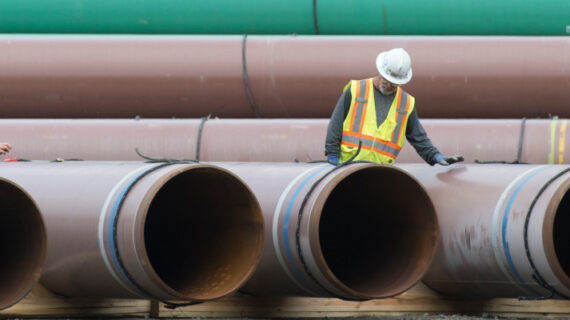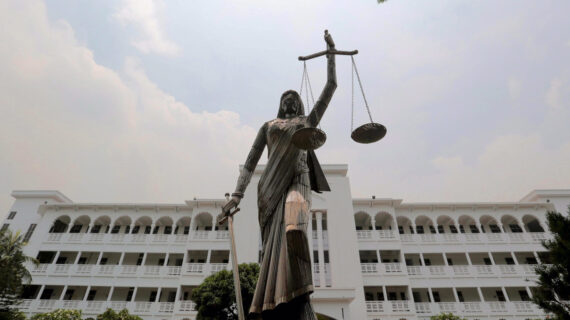In this Hub Dialogue, The Hub’s editor-at-large Sean Speer speaks to Trevor Tombe, a University of Calgary economist.
This conversation has been revised and edited for length and clarity.
Sean Speer
I am pleased to be joined for a Hub Dialogue once again by University of Calgary economist Trevor Tombe who is one of the country’s leading economists and policy thinkers.
Trevor has researched and written extensively on the federal Equalization program and so we’re fortunate to get his thoughts and perspective on this issue on the eve of Alberta’s referendum on equalization.
Thank you for speaking with us, Trevor.
Trevor Tombe
It is my pleasure. Thank you, Sean.
Sean Speer
Let’s just start with a kind of basic question: Why does the referendum question ask Albertans about removing the principle of equalization from the Constitution as opposed to whether the federal Equalization program ought to be reformed?
Trevor Tombe
That’s a great question for which there’s some pretty large differences of opinion. I think it’s fair to say that among some legal scholars and indeed the Alberta government, at least in its public remarks, there’s a view that a referendum decision on a constitutional question obliges the federal government to engage in good faith negotiations on these issues that are of concern to Alberta. A referendum question on a non-constitutional question by contrast would not have that same force and effect. The basis of this view is the Quebec secession reference from the late 1990s.
There is another perspective, though, that the Supreme Court ruling on secession referendums was unique to the specific question of secession because it is something for which there is no constitutional amending formula. There may, in other words, be limits to applying the secession reference more broadly.
Being an economist, I won’t weigh in on which of those two perspectives is the correct one. I tend to think the latter makes more logical sense, but the question is worded in this way, so that it is a simple and an unambiguous question on a constitutional matter. On the formula itself, the Equalization program’s formula is not in any way embedded in the constitution at all. So, asking a formula related question would then therefore not be a constitutional question.
Sean Speer
Do you have any concerns that the Equalization program can contribute to a moral hazard for equalization-receiving provinces? And, if so, are there any ways to mitigate these risks? Or are they simply a justified trade-off to ensure a degree of geographical equity across the country – or as George Will sometimes describes as the “transaction costs of democracy”?
Trevor Tombe
That is a great question and an issue that Equalization’s design has been grappling with from the very beginning because there are many aspects to the formula that create an incentive for recipient provinces to either enact policies or changes tax rates that could in theory decrease the margin of their fiscal capacity to entitle themselves to larger transfer payments.
That’s why things like resource revenue treatment are such a difficult one in particular, because this is an area where a provincial government can directly choose how large its resource revenues are either by changing royalty rates, electricity prices, as is the case in Quebec, or, as in the case of all provinces, approving or disapproving certain resource projects that directly affects fiscal capacity. That means if you’re a recipient province, either like Quebec that potentially charges less for electricity than it could, or like New Brunswick that has different times opted not to develop certain resource deposits, then you would then get larger Equalization payments. That’s a big challenge and partly why resource revenues are not included in the formula at a 100% rate. We include it as only 50% as an effort to try at least to mitigate, although not eliminate, some of these potential incentives.
More broadly, anything that affects the strength of a provincial economy is going to influence average income levels, employment levels and corporate profits and consumer spending. All of that in turn affects your fiscal capacity as well, because average income is going to influence a government’s ability to raise revenue through personal income taxes. So, policies that might detract from growth potentially, such as higher tax rates than you might otherwise choose, can also entitle you to larger equalization payments.
It’s a separate question though whether provincial governments are actually enacting policies explicitly with an eye towards increasing their Equalization payments. It would be interesting to listen in on some cabinet conversations to get a sense of whether these factors influence policymaking. The incentives are certainly there – they’re mechanically there and sometimes quite large, especially in the case of electricity pricing – but it is hard to know how much, if at all, these considerations are an explicit part of provincial policymaking.
Either way, there’s still the question: How can you mitigate it? Well, there’s lots of proposals that have been made over the years. I think a very simple one that has been continually explored and rejected over the years is to not have a formula based on fiscal capacity, but rather to have a formula based on GDP per capita. This is something where a province could nudge it at the margin, but it’s hard for governments to increase or decrease GDP by a lot. It is something that can be nudged up or nudged down through policy choices, but it wouldn’t be subject to the same direct ability to affect in the same way as resource revenues are. It’s something we ought to think more about for sure.
Sean Speer
You mentioned the Equalization formula and how it influences provinces’ eligibility under the Equalization program. Are there any conceivable design changes to the Equalization formula that could produce a markedly different set of distributional outcomes or is much of it driven by how much richer Alberta is relative to other parts of the country?
Trevor Tombe
There’s not a lot of scope for anything resembling a reasonable change to the formula that would result in Alberta receiving any equalization payments. That’s a really hard result to avoid just given how large average levels of economic activity are in Alberta.
Anytime you’re going to have a program that is in any way a function of provincial economic strength – and that’s implicitly what the current Equalization formula does by measuring fiscal capacity – you’re going to be not making payments to higher-income regions like Alberta, British Columbia, Ontario, and so on.
That being said, alternatives formulas or models do exist that would result in different levels of payments for other provinces. I mentioned this macro-based formula based on GDP per capita. That’s something where British Columbia may qualify for payments under because the province’s fiscal capacity is elevated due to high property values, which increases their property tax base. That’s captured in measuring the province’s fiscal capacity, but it’s not reflected in GDP. So, that would matter for them.
Or excluding resource revenues. That would matter a lot for Newfoundland and Labrador, and would almost ensure that they would become a recipient immediately and going forward, whereas excluding resource revenues wouldn’t affect whether Alberta is a recipient
So, the formula matters, certainly. But almost no reasonable formula that I’ve ever seen proposed or that I’ve ever tried to discover would lead to Alberta receiving Equalization payments.
Sean Speer
That’s an interesting point. Does it signal that the province’s economy is more diversified than what is often understood?
Trevor Tombe
Yes. I have a whole paper on the topic with Robert Mansell that we published a few years ago. Alberta’s economy is much more diversified than people give it credit for. Our connection to oil and gas, economically, is an important source of income. It matters a lot for corporate profits, and it matters a lot for government revenue. But it doesn’t matter enough for the other tax bases, including personal income consumption and property values, in a way that would affect the formula itself.
The province’s income levels or wage levels are high across the board in a lot of other sectors. Alberta is just fundamentally a more productive economy. Our population is also much younger, so we have a higher employment rate. Therefore, measures such as fiscal capacity are going to be structurally higher in Alberta than the Maritimes, where one in five people is over the age of 65, and therefore not really working.
Sean Speer
That’s really interesting. One gets the sense from so much of the political discourse that, if you simply back out oil and gas, Alberta suddenly looks like the rest of the country. But you’re saying it’s more complicated than that.
Trevor Tombe
Every economy is going to have a different top sector. Alberta’s top sector, in terms of the share of GDP, is oil and gas. But it’s basically the same contribution to provincial GDP as real estate is to BC. And the financial sector actually makes up a larger share of employment in Ontario than oil and gas does is in Alberta. I think that financial services are the seventh largest employer in Ontario and oil and gas is the eighth largest here in Alberta So, while the sectoral composition differs across provinces for sure, Alberta’s economy is very much like many others in terms of its diversification. It’s far less dependent on a single sector than is often assumed.
Sean Speer
Let’s come back to the Equalization formula. Setting aside what the impact might be on Alberta or any other province, are there changes the equalization formula that you think are worth pursuing in the name of efficiency, equity, simplicity or some other policy goal?
Trevor Tombe
I do. First, I think it’s always worth regular review and reform, for any major policy area. Economic and fiscal circumstances, social circumstances, and political circumstances change. So, taking a look and continuously improving policies and programs should be something that we do in Canada with the Equalization program. Generally, we’ve not made regularized improvement to the program and instead let pressures build before then eventually replacing the formula with some wholesale change that can be politically charged and highly disruptive.
I think a better way to go is to have regular reviews every couple of years and for it to be reviewed by a non-political expert panel, where they can take a look, and report on what potential changes should be. Australia does this through a permanent commission that regularly tweaks and adjusts its intergovernmental transfer programs, and it’s a non-political process. I think we could think about having institutional changes to the equalization formula, so that the formula itself wouldn’t be the focus of so much political attention in the way that it is, and regularized adjustments to it became normalized. That’s one change that I’d make.
And then second, there is a lot of misunderstandings around what the formula is, what the program even is meant to do and how it works. That confusion does tend to make me value a lot the GDP-based or macro-based formula, just because of its simplicity. There wouldn’t be a lot of complex calculations to figure out provinces’ fiscal capacity. We wouldn’t need to worry about resource revenues or sales tax revenues or other policy issues that can be contentious. We would make the formula directly a function of GDP per capita. It has its pros and cons, but the simplicity of it would potentially improve dramatically the public understanding of the program, and might help avoid it becoming symbolic of all sorts of other grievances.
Sean Speer
Are there any other changes that you would make to Canada’s system of fiscal federalism given that in some ways it seems like the debate about equalization reflects a broader sense that there are issues with our system of fiscal federalism?
Trevor Tombe
I’m not entirely sure if it’s indeed the case that this debate is a reflection of concerns about fiscal federalism itself rather than symbolic of many other grievances. Some have to do with federal fiscal policy decisions. But I think a lot of it is also reflective of a broader sentiment in Alberta that’s been building over years due to economic and fiscal challenges in the province. In particular, those challenges facing oil and gas pipeline regulatory concerns. Many will raise concerns around climate policies. Other will look at the provincial deficit and falsely connect it to equalization as a potential contributor to that deficit. So, I’m just not sure that the opposition to equalization is really motivated by fiscal federalism concerns rather than these other issues. They are difficult issues and need some real attention.
But to directly answer your question, Canada’s system of fiscal federalism like the Equalization program does need regular review and reform. I think now post-COVID, the importance of taking a look at doing things a little bit differently across the board, not just with equalization, is something that we really should prioritize.
COVID-19 did change a lot of things – including, for instance, it really made the issue of public debt a lot more salient and more important to think about it in the longer-term context of changing demographics. We’re now going into a situation where the health-care system has been intensely strained. And these strains are not going to dissipate post-COVID because of an aging population. Baby boomer retirements are happening right now, and it’s going to strain provinces, not only through the 2020s, but also into the 2030s.
Currently we don’t have any real mechanisms to reflect the differential pressures demographics are going to create in different parts of the country. I think about Newfoundland, where potentially very soon, one in three, Newfoundland and Labrador residents being over the age of 65. I’m not sure it’s possible for that province to sustain its finances without changes to the broader set of federal provincial transfers. And so, we definitely should take a look. I don’t know what the right answer is, but it’s almost certainly going to be something that thinks hard about demographics.
Sean Speer
Well, Trevor, as always, we appreciate you helping us make sense of these issues, particularly today on the eve of the equalization referendum in the province of Alberta.
Trevor Tombe
Oh my pleasure, anytime.




